Nov. 5 — Day 620 — Behind the eight ball, Bada-bing-bada-BOOM!, Special ops amateur hour
Hi FB!
This review is mostly about Ukrainian behind-the-scenes political maneuvers and media and narrative failures. So if you want the latest from the front, that’s not here.
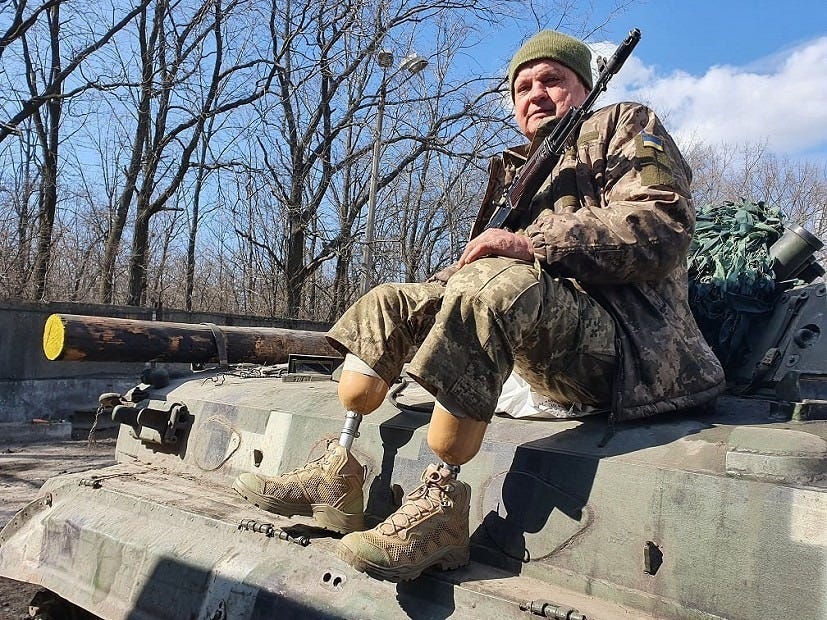
1. Unlucky 128th is unlucky again
Each side managed a very effective long-range strike on Saturday. You probably have seen reports, but in Zaporizhzhia region the Russian air force put a glider bomb into an awards ceremony run by 128th Mountain Assault Brigade, and it appears the munition detonated in the middle of formed troops. Casualty counts are running from 28–60 dead and as many wounded.
Update: Ukrainian military on Sunday said it was an Iksander surface-to-surface missile.
This took place about 20 km. behind the line so out of range of practically all Russian tube artillery, but well within the range of a Lancet drone, Russian rocket artillery, or — obviously — a precision-guided bomb dropped by an airplane.
Since over the course of the war all indicators are Russian air strikes are pre-planned top down, and usually with 24 hours minimum between target identification and bomb dropped, that’s an extremely strong implication that the Russians had substantial prior warning of the awards ceremony, or, less likely, that the Russians are now able at least sometimes to perform on call air strikes against targets of opportunity.
The 128th is out of west Ukraine from super multi-ethic Zakarpatiya, and my POV has a reputation of being a hard luck outfit. Its leadership during the 2014–2021 period got cross-wise with the national government, not least because at the Battle of Debaltseve in 2014 the 128th found itself as the rear guard and, from their point of view, abandoned while, again their POV, the rest of the Ukrainian army retreated out of a Russian encirclement. That cost somewhere between 150–200 dead.
The 128th in recent months according to recent reports was performing reasonably well in fighting in Zaporizhzhia sector, mostly at the east end of the Dnipro Reservoir and the town Vasylkiv.
Ukraine’s new Defense Minister Rustem Umierov went in front of cameras and said the government is aware of the disaster and that it will be investigated. The implication, obviously, is that the 128th has a security leak somewhere, and less obviously, that the 128th leadership may have put troops at risk negligently. It’s not like it’s a secret the Russians have glider bombs or that the 128th is operating in a sector with a significant civilian population.
It is possibly significant that Umierov, a civilian, rather than army commander Valery Zaluzhny, was the official that confirmed the failure. More speculation on that below.
2. You know, these expensive NATO long-range anti-ship missiles really do seem to work
Most of you will have seen the Ukrainians put in a missile strike on a shipyard in Russia-occupied Kherson yesterday and at least two weapons hit a Russian frigate and set it on fire, and the fire brigade hadn’t put it out in about six hours.
The Kremlin’s version of events was it was 14 missiles of which Russia’s mighty air defense forces shot down 12, and that a single ship was “damaged”. This would be more credible if no one remembered what the official version of events from Crimean occupation authorities was in the first hour after the attack, and I’m not making this up: “All Ukrainian missiles were shot down but debris from one of them happened to fall in the vicinity of a dry dock, but no one was hurt”.
As far as reality is concerned, it seems very much like the Russians had been building a guided-missile frigate carrying those nasty Kaliber missiles they shoot at Ukrainian cities, and the vessel was about 90–95 percent complete when the missiles hit.
The missiles, it seems extremely likely, and certainly this is what the Ukrainians are saying, were Storm Shadow/Scalp anti-ship missiles. As far as open sources know, the only means the Ukrainians have of launching those weapons is aboard Soviet-era Su-24 bombers retrofitted to launch the NATO weapons.
I found a graphic on where the Russians supposedly have air defenses around the Kerch shipyard — and the Kerch bridge is right next to this — and it makes one very unpleasant implication for the Kremlin extremely clear: At least sometimes, even against the very best air defenses the Russian military can muster, the Ukrainians can deliver multiple precision-guided missiles on target.
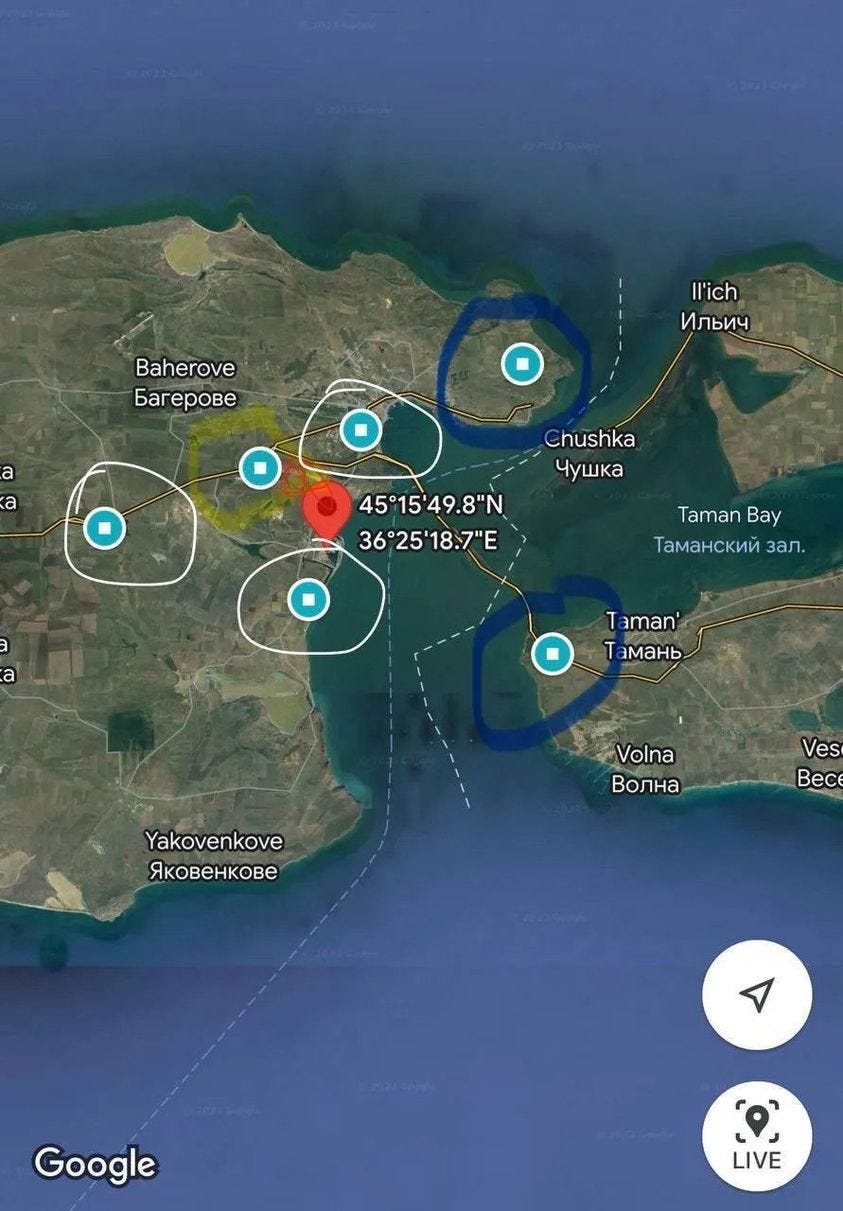
Meaning, the Kerch bridge is still standing only because the Ukrainians judge it’s not time to take it down, or because they don’t have the missiles to shoot. In other words, whether that bridge stands or falls is no longer something Moscow can decided, that’s out of their hands.
Video and local accounts seem to confirm two of the Scalps were indeed shot down, but, at least two good hits are very widely confirmed.
3. Sturm und Drang on the media front: Zelensky is probably really mad but really he can only blame himself
The past week has seen all manner of information warfare and narrative posturing on the Ukrainian side, and honestly it hasn’t worked out so well for the Zelensky team.
First up was an article in Time magazine, which included some interview material directly from Zelensky, which basically painted Zelensky as tiring and increasingly irritable in the face of lack of enthusiasm in the west to back the Ukrainian war effort. Zelensky’s only solution appears only to be to try harder, and that’s why he’s grumpy and depressed, the article said.
The Time reporter, a guy named Simon Shuster, wrote he interviewed Zelensky directly and spoke with several members of the Zelensky administration on background during a two-week visit to Kyiv, meaning he quotes Zelensky advisors and functionaries without using their names. I don’t know where Shuster’s based but it’s outside Ukraine. It’s not clear from the article exactly how many of these anonymous sources talked to Shuster but reading the article it appears to have been three to six.
I’ve no particular axe to grind with Shuster and Time magazine and I’m hesitant to sling mud at foreigner reporting on Ukraine, even if the dude came in for just a couple of weeks. To make the record explicitly clear, I don’t have coffee with Zelensky.
However, also for the record, in the past I’ve found Time reports on Ukraine to be inaccurate, at times seriously so. If anyone wants details I’m glad to provide them in a public forum. The Time story on Zelensky story to me seems to have got the general situation, or more exactly how Zelensky and the Ukrainian national leadership sees the war, at least somewhat wrong. Maybe more.
My read is the Ukrainian national leadership, based on statements and actions observed by me, and conversations with mostly officials and soldiers with access to the national leadership over, well, the war, is that the Zelensky team right now thinks they are slowly winning a war of attrition and that in the final analysis Ukraine and the Ukrainians will outlast Russia, because it’s their country. They point to accumulating Russian material and soldier losses and point out the Ukrainians will keep fighting until those losses change Russian behavior. Same deal as Afghanistan and Vietnam. They are frustrated that western assistance is slower than they would like as that slows Russian exhaustion and departure. But like Uncle Ho said, the result will be the same.
But I’m just one guy with one opinion. Time magazine seems to see the situation and the mindset of Zelensky and his administration differently. Here’s the article:
https://time.com/6329188/ukraine-volodymyr-zelensky-interview/
Shuster actually got interviewed later by one of the leading Ukrainian publications, Ukrainska Pravda, about the article. It’s in English so no need for me to comment, just watch.
From the Zelensky administration point of view, the article’s content and timing caused serious problems, first because the US Congress is in the process of reviewing/planning for further Ukrainian military assistance and a Zelensky telling Time he’s tired and sees no end to the war won’t help that, second because the same message undermines public morale in Ukraine during a real war against the Kremlin and so really — this is not media point-scoring this is national interest — the article damages the Ukrainian national morale and so the war effort, and third because there is a chance there might be Presidential elections in Ukraine next year (not for sure, there’s just talk) and a war-weary Zelensky might be vulnerable to an opposition candidate (Poroshenko? Arestovych? Yatseniuk?) running on a “fresh-blood” ticket.
My best guess based on what I know of the Zelensky administration, which is far from everything, is Zelensky and his media managers, or maybe just Zelensky, gave Time and Shuster unprecedented access, and in doing so they assumed the piece would be just what Zelensky said and Shuster saw.
Clearly Time and Shuster didn’t do just that, instead tracking down some members of the Zelensky administration who — on background — were willing to be more negative about the war than the Zelensky is in official statements.
That seems to have come to Zelensky as a surprise. I expect he was livid. Zelensky is a smart guy who is confident in his skills in messaging, and he is far too clever that to just tell the simple truth to Time or anyone else. Messing up messaging in a format you specifically set up to do messaging, when you know you are a terrific messenger, would make any man mad. Were the man to be under significant pressure — you know, like running a country invaded by Russia — then the frustration level must be substantial.
Even worse for Zelensky’s potential ulcer, he’s the leader of a nation critically dependent on foreign aid and particularly US domestic politics, therefore, not only was the messaging botched in an unforced error in an area of his supposed expertise, but, now there is an article out there, in a major western pub, directly undermining (probably not decisively, but still) the most basic message he’s been making since day one: Ukraine will fight, Ukraine won’t quit, Ukraine won’t flag, Ukraine is confident.
Also, there is the unpleasant problem of deciding whether or not there are rats in the administration and what to do about that. In a time of war, I have no doubt any official who talked to Shuster is being or will be investigated by the SBU. If we start seeing members of the presidential administration getting sacked, that might be why.
At the same time, or more exactly two days later, General Valery Zaluzhny, commander of the Ukrainian army, published an article in Economist magazine, in which he declared Ukraine’s offensive over pending major military tech advances, according to him Russia and Ukraine are in a WWI situation where neither side can advance because defense technologies are too strong. Here’s the link to that article:
Before I get to speculation about the messaging and public information aspect, I observe that WWI ended in not in stalemate but maneuver warfare on all fronts, decisive victory and defeat depending on the belligerent’s side, following the development of better tactics and implementation of some new technologies.
For most war participants (Germany, Austro-Hungary, Russia, Turkey and arguable possibly also France) the collapse of army morale due to crushing casualties was another “World War I thing that happened at the end of World War I”. Also decisive was substantial US material intervention in the war. From a historical point a lot of that is not completely different from the Russo-Ukraine war right now.
As it happens I’m (re)reading a book on the El Alamein battles and particularly Operation Lightfoot, and it’s striking how old the military problem of conducting a deliberate ground assault into strong defenses protected by deep minefields, with the objective of achieving breakthrough and mobile warfare, really is. Given the, er, less-than-ideal state of Ukrainian company to brigade level training, I strongly suspect that Bernard Montgomery and 8th Army engineers could teach the UAF a lot about breaching prepared fortification belts. But I digress.
What Zaluzhny was trying to achieve with the Economist article, is an excellent question. Was he messaging the Zelensky administration that he’s done with wasteful attacks, given the men and equipment available the objectives Kyiv is setting him are impossible? Is he thinking about a run at the Presidency? (I very much doubt it but I promise you inside the Z. administration some people are taking that threat seriously). Or maybe Zaluzhny is mad Zelensky keeps ordering more attacks when attacks probably won’t work, and this is Zaluzhny’s way of outing Zelensky’s “bad” strategy?
A Zelensky administration spokeswoman on Sunday seemed to make clear that the interview was Zaluzhny’s idea and the administration found out about it by reading Economist like everyone else.
This is a lot of theories and I doubt even Zaluzhny and Zelensky know the 100 percent answer. But in general most reporters I know when confronted with the “cock up or conspiracy” paradigm default hope for conspiracy because it’s always a better news story, but expect it will be human error. Most (but not all) of the time, you see a flap in a government or a big corporation or institution, and what really happened is one or more people in positions of responsibility goofed up and then tried to shift blame to others using media.
Which brings me, very smoothly I think, to Viktor Khorenko, a top Ukrainian special forces operator, a Major General, and until yesterday the commander of Ukraine’s highly-respected special operations forces (SSO). According to all accounts over the last year he succeeded in turning Ukraine’s version of the SAS/Delta into a deadly combat force with all manner of battlefield successes confirmed in videos and by independent observers, and as for the secret Russian stuff blown up and assassinated and tracked for targeting, well that’s a secret.
Khorenko’s ousting was just weird and very different from normal job rotations. Normally, when the Ukrainian top brass rotates a man out of a senior position in a government agency that likes to stay confidential, there is a one- or two-line announcement in a government journal that such-and-such dude of such-and-such rank was removed from his job in this place, and he will go on to work in that place.
In Khorenko’s case, according to his own account, speaking to Ukrainian open media, he found out he was sacked from commanding the most elite secret soldiers in Ukraine’s war, first when General Zaluzhny called him up and asked him if he knew he was out of a job, and an hour or two later when he read about how President Zelensky had sacked him, in news reports. This happened on Thursday.
That evening Khorenko — again, by his former job he is the guy that was just running the Ukrainian equivalent of Israel’s Sayeret Matkal — went on live television in phone interview, and told viewers he had no idea the sacking was coming, and that Zaluzhny hadn’t asked for it and so had been just as surprised by Zelensky’s announcement. It seemed from that interview, and later information from the Presidential administration, that Khorenko wasn’t fired for cause, it wasn’t for some failed special operation or military disaster. Supposedly he’ll go on to some other important assignment in military intelligence.
Then on Friday, General Zaluzhny’s office announced, in a statement, that Zelensky requested Khorenko get thrown out of his job and Zaluzhny agreed to do it. This basically directly contradicted Khorenko’s statement the previous evening about Zaluzhny not knowing Khorenko was fired. Perhaps the thinking was that no one in Ukraine can remember anything past a single news cycle. Maybe Zelensky was past caring.
So what the Hell was going on?
Well, I don’t know for sure, but I have a theory. What most media isn’t reporting it because it was less news and more obscure Ukrainian military information only geeks pay attention to, but to my mind may well have had some bearing on this circus, is that on Halloween Oct. 31, none other than Major General Khorenko appeared in a 48-minute interview, published on YouTube not by real news agencies but by the Special Operations command itself. In this content Khorenko holds forth in some detail about how effective Ukrainian special operations troops are, how much Russian troops fear them, and in general how Khorenko and his guys are if not winning the war single-handedly then almost everything they’re doing is great and world-class special ops.
The person tossing Khorenko the soft-ball questions wasn’t a reporter from a news agency or a publication per se, but rather, a woman named Valerya Karpilenko, whose main claim to fame is as a veteran of fighting in Mariupol during the Azovstal siege. This makes her deserving of respect and undoubtedly proves her courage, but it ain’t the same as an independent reporter asking tough questions forcing the interview subject to deliver facts or clam up, and with bunch of editors vetting whatever’s reported for goofy claims and departures from reality and non-sequiturs and so forth, and deleting dumb stuff that has no business being put before the public. Journalism, at least the classic definition, is a good deal more than sitting down with the big boss and asking some nice questions and smiling a lot and nodding pleasantly when he says “that’s secret”.
Here is an excellent write-up of all those moving parts by my Kyiv Post colleague Yulia Struck in English. It contains links to pretty much every part of the Khorenko mess, including Karpilenko’s puff piece interviewing Khorenko.
https://www.kyivpost.com/post/23645
For those of you willing to check out the original Ukrainian and pick out information tidbits from all the heroics, it will probably become clear that Khorenko may be Ukraine’s greatest special operator and a silent killer and a leader of men in combat, but, he needs work on operational security. With all due respect to a man who’s risked his life defending his country, considering there’s a war on, my two cents’, he would have been way better off keeping his mouth shut.
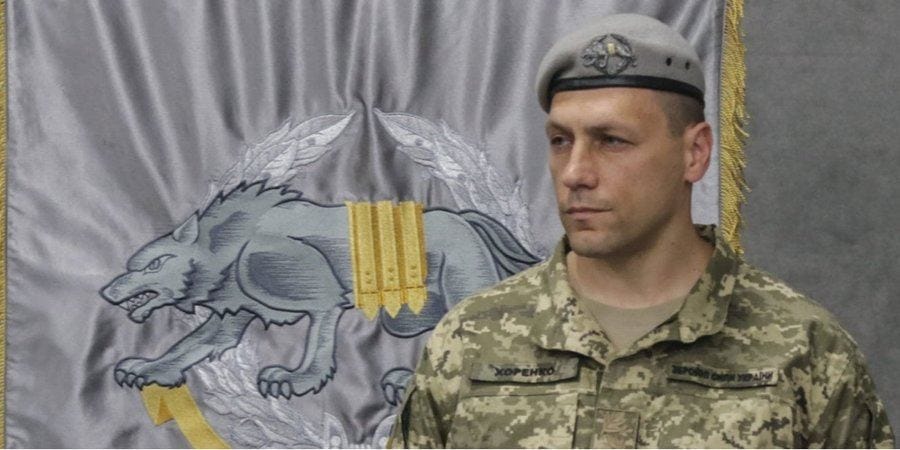
Here are some of pieces of information Khorenko confirmed in the interview, and parallel with that, he and his security flunkies either decided was safe to release to the public, or, decided it wasn’t worth their time to think about security implications. I think we all can see the likelihood of a mindset along the lines of, well, if the Major General in command thought it was worth telling the world, then probably that means there’s no risk to security! Military organizations have that problem — discipline is great but it also reinforces errors of judgement at the top. Among other details, Khorenko confirmed to the world:
- Ukraine SSO on-the-ground operatives were directly responsible for providing targeting information for a Jan 1 2023 strike against a Russian troop center killing 400 and injuring 200, plus equipment
- Ukrainian SSO on-the-ground operatives were directly involved in providing targeting information and after-battle damage intelligence in the Oct. 13 Storm Shadow missile strike that took out two Russian warships in Sevastopol
- Ukrainian SSO on-the-ground operatives did the same thing for the Oct. 17 Storm Shadow missile strike that leveled Russia’s Black Sea Fleet headquarters in Sevastopol.
- Ukrainian SSO on-the-ground operatives were and are directly involved in UAF strikes against Russian airfields including Saki, Melitopol, Berdyansk and Luhansk.
- Ukrainian SSO operatives are on the ground deep inside Russia, now
- Ukrainian SSO operatives have carried out attacks, i.e. sabotage, against military materials production facilities deep inside Russia
- Ukrainian SSO operatives currently are “watching” multiple Russian military material production facilties, including factories, preparatory to attacking them
- Ukraine’s SSO capacity is limited by training capacity and also by the very large number of targets inside Russia that need to be reconnoitered. If the SSO could expand its operations inside Russia it would.
Now, ask yourself (1) How useful is knowing those specifics, not as suspicions but confirmed facts, to future Kremlin military planning, and (2) how likely is it that Khorenko and/or Karpilenko cleared even a word of the YouTube interview with other parts of the Ukrainian war effort? Like government agencies that might have an opinion about how much information about Ukrainian special operations inside Russian territory are released to the public? Like, for starters, the SBU and the Foreign Ministry, and also the Presidential administration and the regular army?
In most countries special operations people like to think of themselves as separate and not subject to all the rules other parts of the government have to follow, and they particularly resist, as a rule, outside interferene and oversight. Special operators, by and large, are recruited with a higher priority on individual intelligence and initiative. This sort of independence is what you need for running 5–10 man teams in behind the lines operations.
But are those the kind of guys you want, in a war, to put in front of a camera without proper supervision? Maybe they thought they were.
I can’t prove it, but my guess is the sequence of events went something like this.
First, Zelensky is waiting for the Time interview article to come out, he’s expecting to seem heroic and dauntless, but instead Simon Shuster paints him as a guy that’s maybe cracking under pressure and who’s getting reduced to something like begging.
Forty-eight hours later General Zaluzhny’s Economist article, which the general wrote himself and out of respect and separation of powers the President’s office didn’t vet, or maybe they just had no idea he had the conversation (which was what the Z. administration was saying on Sunday) comes out. The article announces to the world Ukraine can’t attack and until the UAF gets all manner of new weapons — some of which don’t appear to exist — Russia will keep on occupying large chunks of Ukraine. The worst part about it was, even though Zaluzhny was making statements directly impacting Ukrainian diplomacy and foreign relations, he apparently didn’t think it necessary to run a copy of his Economist article past someone in Zelensky’s office. So no doubt Zelensky was made even madder by that.
THEN a YouTube interview comes out, and it’s Major General Khomenko first informing the world that basically the SSO is winning the war against Russia, and second that several clandestine operations the Kyiv government has a real need to keep deniable, particularly inside Russia, are confirmed the work of SSO operators who, Khomenko keeps saying, are doing great fighting the Russians even if the rest of the Ukrainian military is having trouble. This likewise wasn’t cleared with anyone because, after all, the special ops guys are special and they don’t like outsiders, and even worse civilian “outsiders” interfering with what they do. Or checking. Or asking questions.
I think it is fairly certain that, faced with his third national-level, war-related public relations disaster in a week, the Khomenko YouTube video made Zelensky even madder.
From the Zelensky point of view, the army is running roughshod over the message Ukraine needs in the public domain, the special forces are leaking operationally-important confidential information and don’t seem to care, and his own administration’s decision to give a major US publication unprecedented access has blown up in his face.
Without a scintilla of doubt, any question Zelensky is asking right now, of anyone, about how this train wreck came to pass and who should be held accountable, is being met by one person receiving a government paycheck blaming another official somewhere else in the government.
At some point in the midst all the finger-pointing Zelensky figures out he is the only person that can figure out the truth and force consequences for irresponsible actions, and realizes he has neither the time nor energy to do the sorting out because there’s a war on. So he blows his stack and that’s how Khomenko got fired.
I should add that the Ukrainian reporter Yury Butusov’s read of Khorenko’s sacking wasn’t the cascade of errors I’m theorizing, but rather a calculated retaliation against Zaluzhny for his downbeat Economist article. Butusov is highly credible and his read of Ukraine’s national leadership is not to be lightly dismissed.
But me, personally, I don’t see Zaluzhny as a guy to duke it out with Zelensky in the media, nor do I see the Ukrainian SSO as an organization particularly skilled at public messaging. Also, I watched the entire Khorenko interview and I see hubris and opsec failure, big time.
So I am inclined towards compounded human error as the main driver of events here, but that’s just me.
In any case, bottom line, it’s been a week of real media and public relations chaos at the top of the Ukrainian government and military. You get this from time to time in democracies that go to war, but even when you recognize it for what it is it isn’t very pretty.

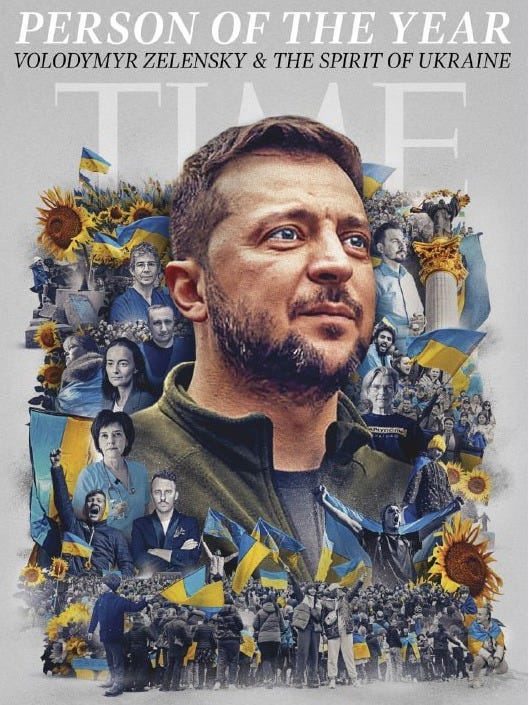
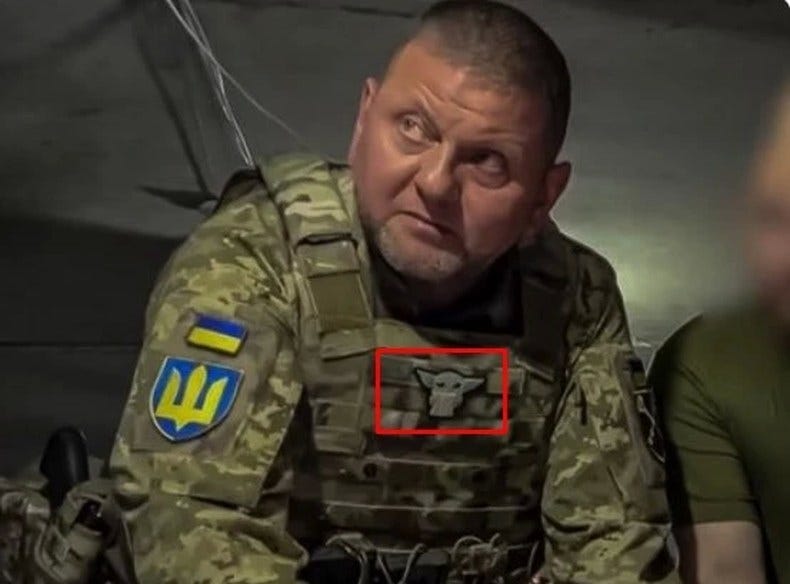
Thanks. Quite insightful! I also thought that self-praising over your own YouTube channel is disqualifying in addition to the many details revealed. Anyone suspects that there are SSO operatives deep in Russia but their task is not made easier when their presence is confirmed by their boss
And to add two more cents of mine to the other topic: I don’t think that Zaluzhny, whose media appearances were up to now very carefully controlled, suddenly unleashed himself and gave an interview and an essay to the Economist without Zelensky administration vetting it. In the cascade of media events, now it might have a bad taste, the message might have been muddied and hence the administration might want to distance from it, to pretend that his was an independent of it oponion, but again I do not think it was a solo (even less Han Solo) action.